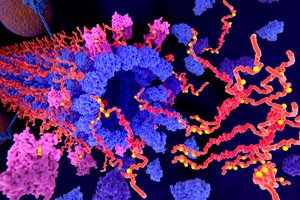
All iLive content is medically reviewed or fact checked to ensure as much factual accuracy as possible.
We have strict sourcing guidelines and only link to reputable media sites, academic research institutions and, whenever possible, medically peer reviewed studies. Note that the numbers in parentheses ([1], [2], etc.) are clickable links to these studies.
If you feel that any of our content is inaccurate, out-of-date, or otherwise questionable, please select it and press Ctrl + Enter.
Tau protein shows unexpected benefits in reducing brain damage
Last reviewed: 02.07.2025
 ">
">A study by researchers at Baylor College of Medicine and the Ian and Dan Duncan Neurological Research Institute at Texas Children’s Hospital found that the protein Tau, known to be a key factor in the development of several neurodegenerative diseases, including Alzheimer’s, also has a positive function in the brain. Tau reduces neuronal damage caused by excess reactive oxygen species (ROS), or free radicals, and promotes healthy aging. The study was published in the journal Nature Neuroscience.
“ROS are natural byproducts of various cellular functions in the body. While low levels of ROS are beneficial, excess levels are harmful to cells because they cause the formation of toxic forms of other molecules, leading to oxidative stress, including peroxidized lipids,” said lead author Dr. Lindsay Goodman, a postdoctoral fellow in Dr. Hugo Bellen’s lab. “Neurons are particularly susceptible to oxidative stress and will be destroyed if peroxidized lipid levels are not properly controlled.”
Lipid droplets protect the brain from oxidative damage
There is growing evidence that our brains have developed several neuroprotective strategies to combat ROS-induced damage.
One such strategy, discovered by Bellen’s team in 2015, is that neurons export these toxic peroxidized lipids to neighboring glial cells, which then sequester them in lipid droplets for storage and future energy production. “This process effectively removes and neutralizes these toxic lipids,” Goodman noted. “In the current study, we examined the role of tau in lipid droplet formation in glial cells.”
The team found that normal endogenous Tau in flies is required for the formation of lipid droplets in glial cells and for protection against ROS in neurons. Similarly, Tau is required for the formation of lipid droplets in glial cells derived from rats and humans.
Although expression of normal human Tau was sufficient to restore the formation and maturation of lipid droplets in glial cells in flies lacking native Tau, when this human Tau protein carried mutations associated with increased risk of Alzheimer's disease, glia were unable to form lipid droplets in response to ROS in neurons.
This suggests that mutations in Tau may reduce the protein’s normal ability to prevent oxidative stress, in addition to causing the protein accumulation typical of the disease, as described in previous studies. Overall, these data support a novel neuroprotective role for Tau in combating ROS-related toxicity.
Additional disease links were found using fly and rat models of Tau-induced conditions in which human Tau protein with mutations was overexpressed in glial cells. In these scenarios, the researchers again observed defects in glial cell lipid droplets and cell death in response to ROS in neurons. This showed that Tau is a dosage-sensitive regulator of glial cell lipid droplets, and that too much or too little of it can be harmful.
“By revealing a surprising new neuroprotective role for tau, the study opens the door to potential new strategies to slow, reverse, and treat neurodegenerative diseases,” said Bellen, corresponding author of the paper. He is a professor of molecular biology and genetics at Baylor and holds the Duncan NRI Chair in Neurogenetics. Bellen is also the March of Dimes Professor of Embryonic Biology at Baylor.
In contrast to its usual “negative” role in neurodegenerative diseases, this study demonstrates that Tau also plays a positive role in glial cells, helping to sequester toxic lipids, reducing oxidative damage and thus protecting the brain. However, in the absence of Tau or in the presence of defective Tau proteins, this protective effect is lost, leading to the development of diseases.
